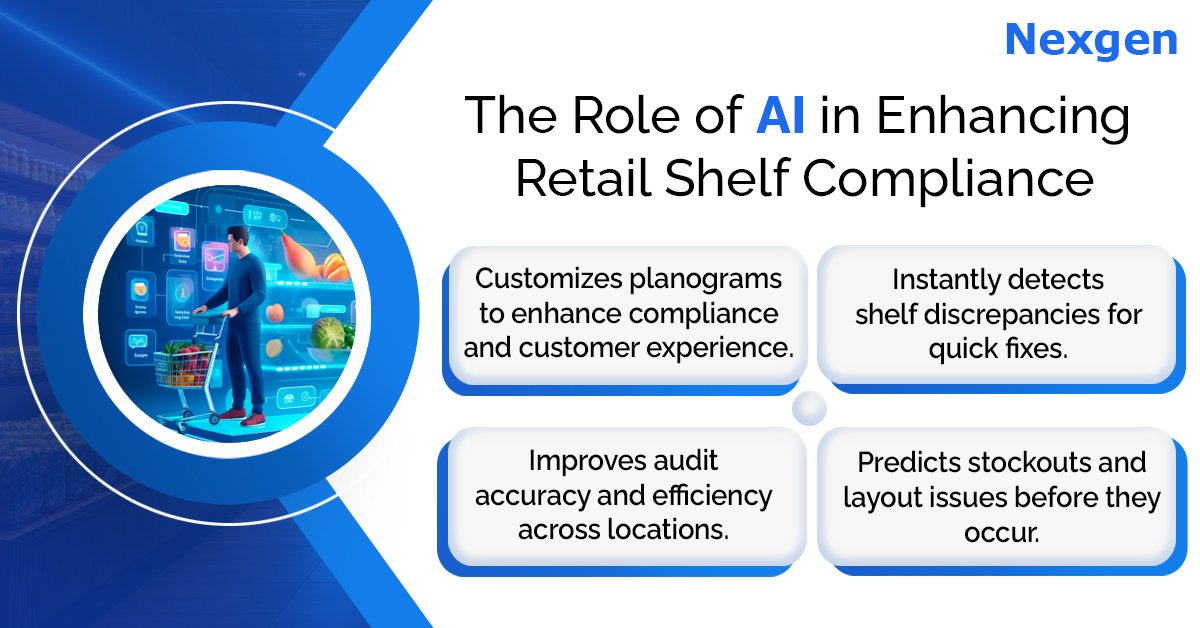Retail shelf compliance is a critical aspect of successful in-store execution. It ensures that products are accurately displayed, priced, and stocked, maximizing sales opportunities and customer satisfaction. However, traditional manual checks are time-consuming, labor-intensive, and prone to human error. This is where Artificial Intelligence (AI) is revolutionizing the industry.
Real-time monitoring and reporting: AI-powered image recognition technology enables retailers to capture shelf images and instantly analyze them against predefined planograms. With sophisticated algorithms, discrepancies such as missing products, misplaced items, or incorrect shelf labels are identified in real-time, allowing for swift corrective actions.
Automating audits for accuracy: Traditional manual audits are time-consuming and prone to human error. AI automates the auditing process, ensuring greater accuracy and efficiency. AI systems can evaluate vast amounts of data quickly, providing detailed insights into compliance levels across multiple stores and regions.
Predictive insights for proactive management: AI does not just address current compliance issues - it anticipates them. By analyzing sales trends, inventory data, and customer behavior, AI predicts potential stockouts or layout inefficiencies, helping retailers proactively address problems before they impact shelf compliance.
Improving collaboration with suppliers: AI-powered dashboards enable retailers and suppliers to have a shared view of shelf compliance data. This transparency fosters better collaboration, as both parties can work together to ensure products are stocked and displayed according to agreements.
Optimizing planogram execution: AI assists in the creation and deployment of planograms tailored to store-specific needs. By continuously learning from customer preferences, sales patterns, and store layouts, AI powered planograms helps to enhance both compliance and sales performance.
Enhancing customer experience: A complaint shelf not only ensures that products are available but also enhances the overall shopping experience. AI helps retailers maintain clean, organized, and intuitive displays, making it easier for customers to find what they need, thereby boosting satisfaction and loyalty.
Benefits of AI-Driven Shelf Compliance

- Increased sales: By ensuring accurate product availability, pricing, and display, AI can significantly boost sales
- Improved customer satisfaction: Reduced out-of-stocks and accurate pricing enhance the customer shopping experience.
- Reduced costs: Automation can significantly reduce labor costs associated with manual audits.
- Enhanced operational efficiency: Real-time insights and automated workflows improve operational efficiency.
- Data-driven decision making: AI provides valuable data and insights to support informed decision-making.
Conclusion:
AI is transforming the retail landscape by revolutionizing shelf compliance. By automating audits, providing real-time insights, and enabling predictive analytics, AI empowers retailers to optimize in-store execution, enhance customer satisfaction, and drive significant business growth. As AI technology continues to evolve, we can expect even more innovative solutions to emerge in the coming years, further enhancing the efficiency and effectiveness of retail operations.
Get Your Free Trial Now!